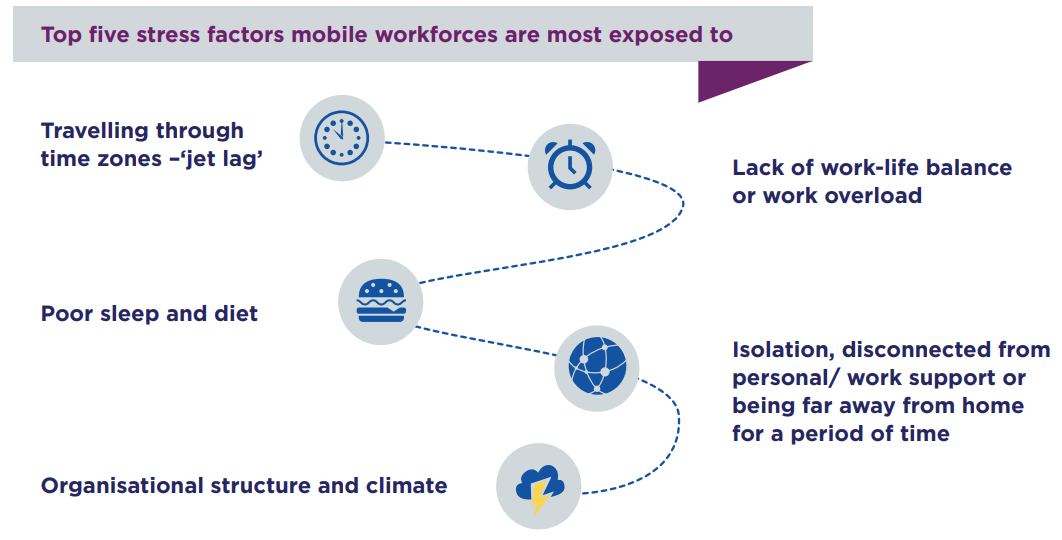There are a lot of different approaches to how mental health problems are diagnosed, what causes them and which treatments are most effective. And, unfortunately, there is still widespread stigma and discrimination towards people with mental health problems, and misunderstanding about what different diagnoses mean.
Travel is increasingly being acknowledged as a trigger point for mental health cases. Regardless of if the trips are short and frequent or long deployments, travel can expose people to unfamiliar and unexpected situations. From feelings of homesick to sensory overload, many situations can trigger stress and anxiety, while tiredness from travel, jetlag and unfamiliar surroundings can also impact well being.
A new regional study 'Business Travel and Emotional Support Study - Australasia' from medical and travel security services firm International SOS has highlighted how dealing with the complexity of business travel or life abroad can impact a mobile workforce's health and well-being. The survey responses from nearly 100 of Australia and New Zealand's leading organisations showcases how life as a mobile worker can bring unforeseen stress and strain.

The largest consequences from business travel were identified across three criteria - physiological (jetlag, deep-vein thrombosis, poor eating and drinking patterns, less exercise); social (loss of family role, reduced time for home-based social life, emotional upset, imbalance domestic responsibility); and psychological and emotional (isolation, psychological and mental health disorders, inbox overload, sensory overload shock).
When discussing negative effects of travel, jetlag is commonly raised as a 'safe' topic for discussion, according to Dr Jo Holdaway, medical director of Mental Health at International SOS, however, research shows there are other factors that may impact the mental health of travellers, including issues arising from unforgiving workloads or being far away from loved ones.
"Mobile workers experience a variety of stressors added to their normal work pressure that could be proactively addressed by organisations," Dr Holdaway says. While, it is clear that organisations are better connected with travellers under their Duty of Care agendas, this may not ultimately support mental well-being.
Companies want to take care of their employees and are increasingly realising this also includes emotional and mental health, especially for their mobile travellers who face environments that exacerbate stress-inducing factors. It is important for organisations to start putting stronger pre-departure risk management procedures in place to help employees manage workplace stress.
The International SOS regional survey highlights that across Australia and New Zealand 56% of organisations currently support the mental health of their travellers, but only 44% of them proactively communicate this emotional support to their mobiles workers
Companies invest in the success of their mobile workforce's business trips and overseas assignments; however, emotional support systems are still often overlooked as a way to decrease the likelihood of a failed assignment.
The survey highlights that 87% of organisations do not have a mental health screening process pre- and post-travel for employees with a history of emotional or mental health issues, 83% of organisations do not provide mental health screenings for family members of international assignees and expats pre- and post-deployment, while less than a quarter (24%) of respondents knew if their travel insurance policy covered mental health related treatment and repatriation costs incurred due to mental illness.
"Organisations sending employees on short- or long-term assignments abroad need to consider pre-trip emotional support that is appropriate for the destination and reactive response support systems that can be implemented quickly in times of an unexpected incident or accident," explains Dr Andrew Ebringer, regional medical director at International SOS.
Research shows the potentially negative effects of travel range from physical health to social relationships and emotional well-being. This expands beyond the traditional focus on medical assistance and travel security advice whilst abroad.
The International SOS report says support for one's overall well-being should include all three aspects of travel - medical, security and emotional support - as a holistic and integrated travel risk management service offered by organisations to their travellers. These, it says, should not be isolated services with separate phone calls and protocols, but one source of aid.
"Having a comprehensive travel risk management program helps ensure the overall safety and well-being of mobile travellers and provides peace-of-mind to organisations that they are fulfilling their Duty of Care whilst protecting their workers," the report explains.